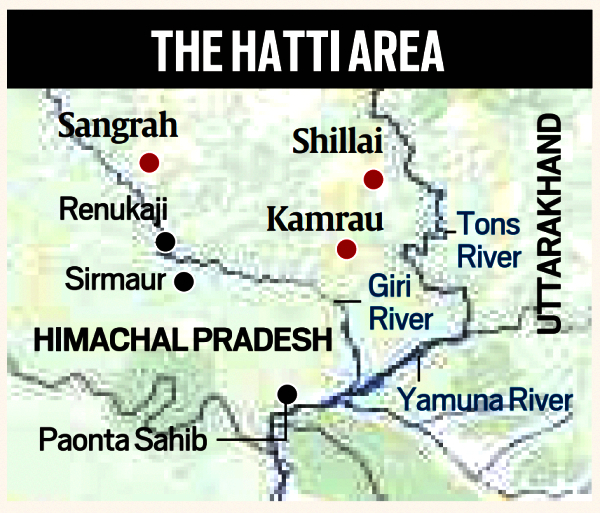ForumIAS announcing GS Foundation Program for UPSC CSE 2025-26 from 19 April. Click Here for more information.
ForumIAS Answer Writing Focus Group (AWFG) for Mains 2024 commencing from 24th June 2024. The Entrance Test for the program will be held on 28th April 2024 at 9 AM. To know more about the program visit: https://forumias.com/blog/awfg2024
Source: The post is based on the article “Explained: The demand for ‘tribal’ status for Himachal’s Trans-Giri and its Hatti community” published in Indian Express on 19th July 2022.
What is the News?
The Government of India is considering the Himachal Pradesh government’s request for the inclusion of the Hatti community in the list of Scheduled Tribes in the state.
Note: The list of STs in Himachal Pradesh includes Gaddis, Gujjars, Kinnaras (Kinnauras), Lahaulas, Pangwalas, and some other smaller tribes.
Who are Hattis?

The Hattis are a close-knit community who takes their name from their traditional occupation of selling home-grown crops, vegetables, meat, and wool at small-town markets known as ‘haats’.
Lives in: The Hatti homeland straddles the Himachal-Uttarakhand border in the basin of the Giri and Tons rivers, both tributaries of the Yamuna.
– They live in the Trans-Giri area in today’s Himachal Pradesh and Jaunsar Bawar in Uttarakhand.
Note: Jaunsar Bawar was once part of the royal estate of Sirmaur. It was conquered by the British in 1814. The two Hatti clans, in Trans-Giri and Jaunsar Bawar, have similar traditions, and inter-marriages are common.
Caste System: There is a rigid caste system among the Hattis — the Bhat and Khash are the upper castes while the Badhois are below them. Inter-caste marriages have traditionally remained a strict no-no.
Traditional Council: The Hattis are governed by a traditional council called Khumbli, which is like the khaps of Haryana. The council decides community matters. The Khumbli’s power has remained unchallenged despite the establishment of the Panchayati Raj System.




